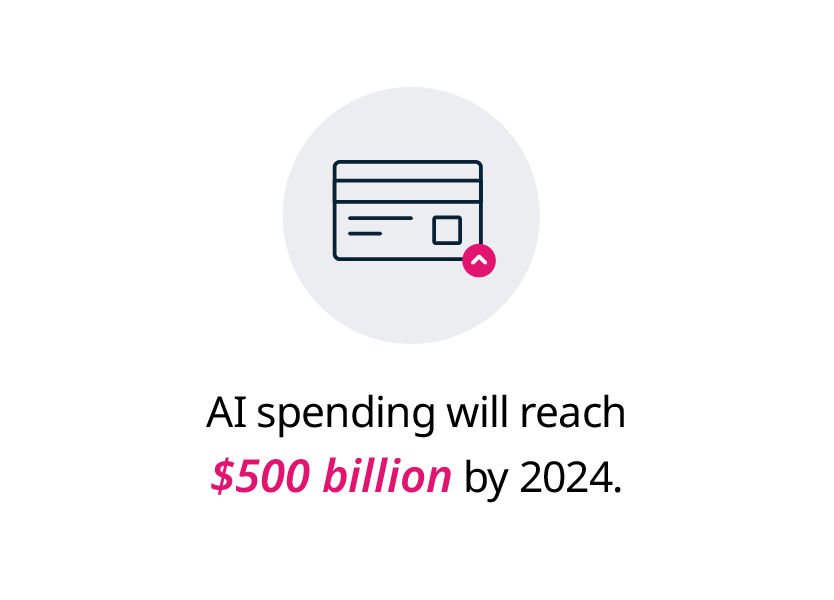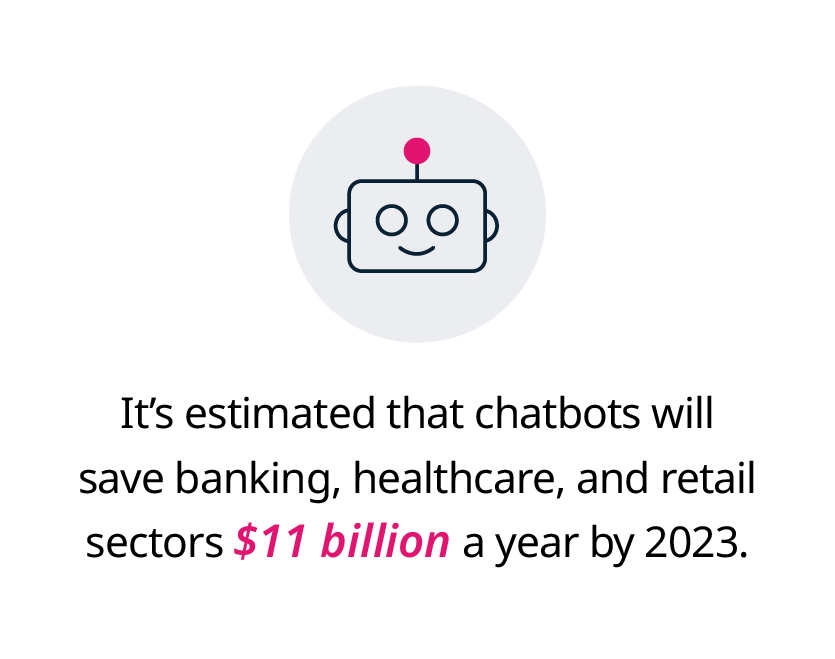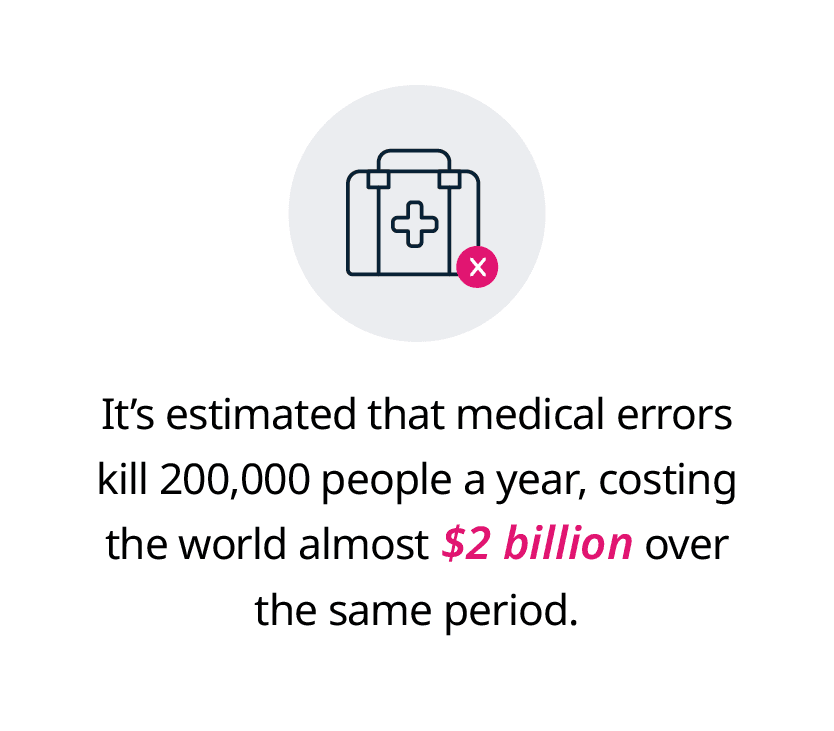The Future of AI: 5 Industries That Will Be Most Affected
As one of the most significant technological advancements in recent years, artificial intelligence (AI) is set to increasingly disrupt the way industries and businesses work. While it’s not yet a mainstream technology, billions of dollars are annually spent on AI research and development, helping to accelerate adoption across sectors. By 2024, AI investment is predicted to reach more than $500 billion.1

With new applications and possibilities discovered all the time, AI’s impact on the business world promises to be nothing short of transformative. Discover a human-centered approach to deploying machine learning and learn to use AI as a tool for inclusive prosperity with the Making AI Work: Machine Intelligence for Business and Society online short course from the MIT Sloan School of Management and the MIT Schwarzman College of Computing.
Some of the largest industries currently affected by AI include:
1) Information technology (IT)

IT relates to anything involving computer technology,2 while AI is “the ability of a computer to act like a human being.”3 The two have a symbiotic relationship, together driving innovation. AI combines software, hardware, and intelligence; combines neural language processing and a neural network, to perform complex tasks. IT is a part of AI that focuses on the software that conducts tasks by a computer, and needs to be pre-programmed – it doesn’t self-adapt.4
AI is a branch within computer science that has multiple applications: speech recognition, image processing, deep learning, machine learning, and natural language processing. AI has been shown to improve IT through process automation, quality assurance, and service management, providing additional layers of effectiveness, competitiveness, and accuracy.5
Data security
IT is often used for securing private, confidential information whether it’s for organizations, governments, or members of the public. IT can provide the basis for keeping this information secure, but as new threats emerge, it needs to be redone. AI, on the other hand, can adjust the system when identifying threats, breaches, and other security issues, solving them quickly and securing the confidentiality of the data.6
Process automation
By utilizing AI with IT, costs can be reduced and time can be saved. IT on its own is incapable of changing based on data, however, AI algorithms learn and evolve. This allows for more efficient work, better backend processes with deep learning networks, and better coding.7
2) Finance

AI and ML algorithms offer great potential in the finance industry. These algorithms are self-learning and can be extremely valuable to both the customer and the financial organization if fed the right data.
To learn more about these technologies and how they can be incorporated into your business strategy, explore the MIT Sloan and MIT CSAIL Machine Learning in Business online short course, which includes modules such as: implementing machine learning in a business, helping machines learn to use language, finding patterns in human transactions, and machine learning challenges and future.
Let’s explore a few applications:
Financial advisory services
The financial sector can expect to encounter more AI-powered robo-advisors in the future. According to new data from Wealthramp, for example, “Millennials’ outlook on the future of financial advice is more digitally focused and purpose-driven.” Wealthramp also found that “A third of high-net-worth investors are using robo-advisors and digital apps to execute investments.”8
Another emerging field is bionic advisory, which combines machine calculations and human insight to enhance client relationships better than what either machine or human can provide alone.9
Trading
AI and ML can also be used to make data-based decisions about investments and when to buy and sell stocks. Machines are great at predicting future behavior of stocks because they can crunch a vast amount of data in a short time frame. This makes them extremely valuable to traders and investors. Machines can also observe patterns in past data streams and forecast how they might repeat in the future. Furthermore, by using a supercomputer and advanced mathematics, machines can track and understand market drivers, which means that humans can make more intelligent investment and trade decisions.10
Would you like to learn more about trading algorithms and how they can impact your financial choices? The Oxford Algorithmic Trading Programme from Saïd Business School, University of Oxford demystifies algorithmic trading and will help you develop the ability to implement your own trading strategies.
3) Marketing

Digital marketing is using several AI-powered tools to predict consumer behavior, ad placement, content creation, and more. Let’s dive into some of the AI-marketing use cases:11
Tailored marketing processes
More than ever before, AI will allow marketers to reach consumers based on their interests and demographics. In addition, the technology will make it easier to put customers into distinct groups that provide for more accurate segmentation and marketing content.
AI will also be better able to track the type of content consumers find interesting. This knowledge can help businesses to offer customers experiences that are highly tailored and beneficial to them, which could lead to higher conversion rates.
AI technology could also help marketers separate their customers into distinct persona groups depending on their place in the sales funnel and understand exactly what motivates them.
AI also allows marketers to track which messages, such as email or text, are interacted with, deleted, or shared. It also allows for A/B testing, where, for example, emails with two different subject lines are sent out and tracked to determine which is more successful in getting the audience to open the email.
Improved customer interactions
AI chatbots enable personalized customer service, quickly helping customers find answers to frequently asked questions or to quickly resolve common issues. These virtual assistants are becoming more sophisticated and can help build stronger relationships with customers in a way that’s cost-effective, efficient, and consistent.
Chatbots are also increasingly being used to engage customers during the sales process. In fact, Business Insider’s Insider Intelligence predicts that consumer spend through chatbots will reach $142 billion by 2024 worldwide – up from $2.8 billion in 2019. It’s estimated that chatbots will save banking, healthcare, and retail sectors $11 billion a year by 2023.12

4) Healthcare

AI is also transforming the healthcare industry.
According to the McKinsey Executive Briefing, possible applications of AI include apps that patients could use to track their health, online symptom checkers, virtual agents for hospitals, bionic pancreas for people living with diabetes, e-triage tools that predict health outcomes, tools that optimize hospital-bed management, and apps that assist with paperwork.13
“In most cases, the question is less whether AI can have impact and more how to increase the potential for impact and, crucially, how to do so while improving the user experience and increasing user adoption,” the McKinsey briefing notes.14
Automation of tasks
AI is becoming increasingly capable of automating the mundane and repetitive tasks healthcare practitioners face. The technology could, for example, reduce the time it takes to analyze a bacterial swab and prescribe a suitable antibiotic. This application gives the physician more capacity to perform higher-level responsibilities such as patient education and clinical assessment.15
An increasing number of healthcare stakeholders are also leveraging the power of AI to automate decision-making and parts of the supply chains to make financial and administrative work more efficient.
AI can also take away certain human elements, such as medical errors. It’s estimated that medical errors kill 200,000 people a year, costing the world almost $2 billion over the same period.16

David Bates, a Harvard professor and chief of internal medicine at Harvard-affiliated Brigham and Women’s Hospital, says, “I’m convinced that the implementation of AI in medicine will be one of the things that change the way care is delivered going forward. It’s clear that clinicians don’t make as good decisions as they could. If they had support to make better decisions, they could do a better job.”17
Rather than replacing healthcare practitioners, AI can provide support, helping these professionals to make better decisions and be more efficient.
Wellness wearables
Leveraging insights from AI-powered wellness wearables is already helping with disease diagnostics. Health data gathered by wearables is being used for heart disease research, heart rate data, as well as activity and sleep tracking.18
The University of Michigan Health held a study with the Apple Watch to determine how well it tracks health. Lead research communicator for Michigan Medicine, Kelly Malcom, found that the study covered a diverse set of individuals, and that the data gathered from the watches were accurate, a point often in contention.19
“Researchers in the health and wellness space have typically relied on people to report their personal health data, like activity levels, heart rate or blood pressure, during brief snapshots in time,” Malcolm says. “Wearable health devices, such as the popular Apple Watch, have changed the game, surfacing meaningful data that can paint a more complete picture of daily life and resulting health and disease for clinicians.”
High-end devices are taking over from basic fitness trackers – a sign that consumers want devices that can do more than just count steps. By 2026, the wearable device market is estimated to reach $30.1 billion, up from $16.2 billion in 2021.20
With an increasing number of smart device users, and data available at our fingertips, patients will be able to share their data with their doctors, helping to diagnose and manage disease. In turn, it will become easier for doctors to create more personalized treatment plans. These are just some of the ways in which AI will continue to disrupt the healthcare industry. Learn more about AI’s impact on medicine in the six-week Artificial Intelligence in Health Care online short course from the MIT Sloan School of Management.
5) Transport
Transportation is one of the main industries currently affected by AI. We’re already seeing the emergence of self-driving cars, thanks to companies like Tesla and Waymo. Even though the current models still need a driver at the wheel, completely autonomous cars are likely to be adopted as the hardware becomes more sophisticated.21 By 2023, it’s expected that 54 million self-driving cars will be on the road globally, up from 31 million in 2019.22
Automated fleets
Leaders in partnering with AI start-ups, Walmart, Kroger, and Ablertsons are working with companies to use autonomous vehicles for deliveries. This use of autonomous vehicles has been shown to cut logistics-related costs by as much as 30 percent.23
Automated vehicles could yield vast amounts of data that can be used to improve efficiency in the future, from tracking traffic and optimizing delivery routes, to processing payments.24
Autonomous cars and trucks, self-organizing fleets, smart containers, and driverless taxis are just some examples of what to expect in the transportation industry.
Transport services

AI innovations in transport services will influence how we engage with transportation in several ways. In the future, consumers are likely to shift from owning personal vehicles to utilizing car services on demand, taking away the need for car ownership. In addition, AI technology could enable users to plan their trips using multiple means of transportation and manage the entire experience through their smartphones. Lower costs as a result of more efficient fleet management and the flexibility of setting up trips will make the transportation-as-a-service approach a popular choice for getting around. With ride-sharing services, customers will be able to share an autonomous car across an optimized route , allowing for cheaper, safer travel, and changing how commuters move from point A to B.25
AI has made its way into our everyday lives, and if an industry uses something that can be automated, it can be disrupted by AI.
So, what is the future of AI? While we can’t completely predict every way in which AI will impact business in the coming years, we know that its influence will be profound. As the technology becomes more sophisticated and its applications grow, business leaders are becoming increasingly motivated to understand what AI means for them and the future of their industries. Learn about the implications and possibilities with an artificial intelligence online short course, from some of the world’s top universities.
The MIT Sloan and MIT CSAIL Artificial Intelligence: Implications for Business Strategy online short course looks at how you can implement this technology into your organization. In just six weeks, you’ll gain the skills and insights to turn your company into an innovative, future-thinking business, with an understanding of robotics and machine learning in the workplace. Read what past participants thought of the course here.
Transform your business with AI
- 1 (Aug, 2021). ‘IDC forecasts companies to spend almost $342 billion on AI solutions in 2021’. Retrieved from IDC.
- 2 (Nd). ‘IT’. Retrieved from TechTerms. Accessed on January 5, 2022.
- 3 (Nd). ‘Artificial Intelligence’. Retrieved from TechTerms. Accessed on January 5, 2022.
- 4 (Nd). ‘Importance of artificial intelligence (AI) in information technology’. Retrieved from SoulPage. Accessed on January 7, 2022.
- 5 (Nd). ‘AI in IT. How artificial intelligence will transform the IT industry’. Retrieved from Softengi. Accessed on January 7, 2022.
- 6 (Nd). ‘Importance of artificial intelligence (AI) in information technology’. Retrieved from SoulPage. Accessed on January 7, 2022.
- 7 (Nd). ‘Importance of artificial intelligence (AI) in information technology’. Retrieved from SoulPage. Accessed on January 7, 2022.
- 8 (Dec, 2021). ‘High-net-worth millennial investors usher in a new era of digital investing, but not without the guidance of financial advisors’. Retrieved from Businesswire.
- 9 Kannan, G. (May, 2021). ‘The bionic advisor: The future of wealth management’. Retrieved from The Borneo Post.
- 10 Cohan, W. (May, 2020). ‘Can an artificial intelligence learn to beat the stock market?’. Retrieved from Fast Company.
- 11 (Nd). ‘How to leverage AI in marketing: three ways to improve consumer experience’. Retrieved from Deloitte. Accessed December 10, 2021.
- 12 (Feb, 2012). ‘Chatbot market in 2021: stats, trends, and companies in the growing AI chatbot industry’. Retrieved from Business Insider.
- 13 Spartharou, A., Hieronimus, S., & Jenkins, J. (Mar, 2020). ‘Transforming healthcare with AI: The impact on the workforce and organizations’. Retrieved from McKinsey & Company.
- 14 Spartharou, A., Hieronimus, S., & Jenkins, J. (Mar, 2020). ‘Transforming healthcare with AI: The impact on the workforce and organizations’. Retrieved from McKinsey & Company.
- 15 Buhler, K. (Aug, 2020). ‘3 Ways artificial intelligence will change healthcare’. Retrieved from Forbes.
- 16 Powell, A. (Nov, 2020). ‘AI revolution in medicine’. Retrieved from The Harvard Gazette.
- 17 Powell, A. (Nov, 2020). ‘AI revolution in medicine’. Retrieved from The Harvard Gazette.
- 18 Wetsman, N. (Jul, 2019). ‘Data from health apps offers opportunities and obstacles to researchers’. Retrieved from The Verge.
- 19 Malcom, K. (Oct, 2021). ‘Apple watch study provides an unprecedented look at the health status of a diverse patient population’. Retrieved from University of Michigan Health Lab.
- 20 (Dec, 2021). ‘Wearable Healthcare Devices Market Worth $30.1 billion by 2026 – Exclusive Report by MarketsandMarkets™’. Retrieved from PR Newswire.
- 21 Molla, R. (Oct, 2021). ‘Self-driving cars: the 21st century trolley problem’. Retrieved from Vox.
- 22 Fitzgerald, S. (Dec, 2021). ‘54 Million Autonomous vehicles will be on our roads by 2024’. Retrieved from Thomas.
- 23 Holland, F. (Nov, 2021). ‘Walmart is using fully driverless trucks to ramp up its online grocery business’. Retrieved from CNBC.
- 24 Fox Cahn, A. and Loshkajian, N. (Dec, 2021). ‘Congress will make your car spy on you’. Retrieved from The Hill.
- 25 Rose, M. (Nov, 2021). ‘A look into autonomous vehicles on Michigan State’s campus’. Retrieved from The State News.
